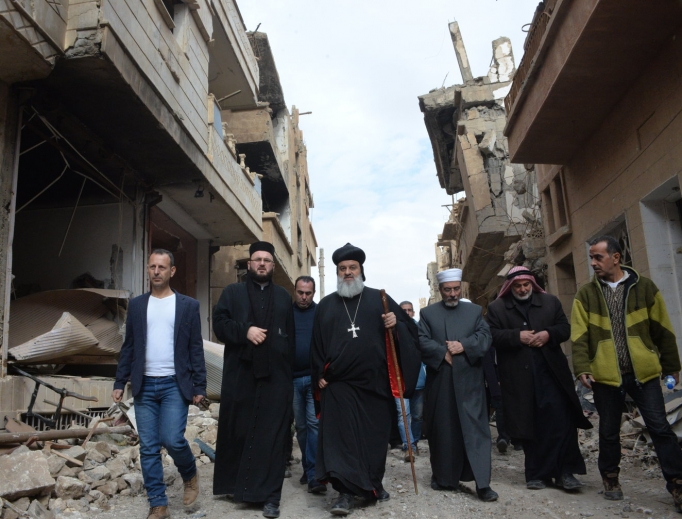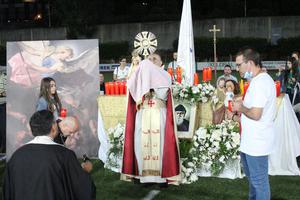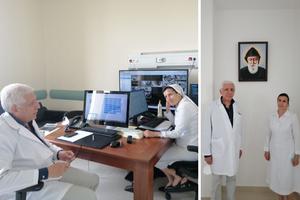Syriac Orthodox Patriarch Petitions West to ‘Sympathize With Us’
Patriarch Ignatius Aphrem II remains hopeful that his people can eventually return to the Nineveh Plain.

Syriac Orthodox Patriarch of Antioch Ignatius Aphrem II became patriarch in 2014 as Syria was in the throes of war. Several months later, Syriac Orthodox were among the 100,000 Christians driven out by the Islamic State from the Nineveh Plain in Iraq.
A native of Qamishly, Syria, the 53-year-old patriarch previously served as archbishop and patriarchal vicar of the Archdiocese of the Syriac Orthodox Church for the Eastern United States 1996-2014. During his tenure, he established a number of new parishes in the archdiocese in Washington, D.C., Florida, Georgia, Indiana, New Jersey, Texas and Virginia.
The approximately 5 million members of the Syriac Orthodox Church are divided into 26 archdioceses and 11 patriarchal vicariates. Its original area is present-day Syria, Turkey and Iraq.
He spoke with Register correspondent Doreen Abi Raad during a visit to the patriarchal residence in Atchaneh, Lebanon, from the patriarchate in Damascus, Syria.
You recently celebrated the first Holy Qurobo over the ruins of the Virgin Mary Church in Deir ez-Zour, Syria. Can you describe for the Register what you experienced in the city and how it was for you personally?
First of all, because of the siege of Deir ez-Zour, all of the Christians fled the city — all except for one man. Our church opened a clinic there about two months ago to serve the needs of the people, as there is a great demand for health services because of the destruction.
Some Christians have gone back over the last few weeks, so we decided to go and to inspect the city and the churches — and also to offer the Holy Qurobo Mass, hopefully to give hope to the people.
The Virgin Mary Church was in an area that was controlled by the rebels — the terrorists — and the destruction was everywhere. We had to go through the rubble; there was shrapnel everywhere. There were even the remains of mortar shells.
Arriving to the church, I was speechless. I cannot describe my feelings. I just felt we were in front of evil — I’m not referring to the church, of course — but what we saw there was nothing short of evildoing, of people who took revenge, because there were things in our church that were burned as well as destroyed.
But it’s our duty as religious to give hope to the people, and that’s what we tried to do by offering the Holy Qurobo for the first time after five to six years since the city was under siege by rebels. About 15-20 people attended, including Christians and some Muslim religious leaders, who stayed for the entire Mass. Syrian soldiers were around to make sure we are safe.
After we finished the Mass, we inspected the Syriac Catholic church across the street, which was also destroyed. Then we went to the Armenian Catholic church, which was partially destroyed. We went to a couple of mosques, which were also destroyed.
Seeing all that devastation, it made me wonder: How much lower can a human being go?

It appeared that Syria was on a path to stability, and then, in January, it seems the situation started to spiral out of control, with bombardments in a number of areas, particularly Damascus, followed by Turkey’s offensive in Syria’s northern region. What is your perspective, and what are your concerns?
I believe the violence has to do with the Sochi meeting (the Jan. 30 Moscow-sponsored peace conference for Syria) and the attempt to bring Syrians together to talk and discuss their future. Obviously, there are powers that don’t want this to happen, or maybe they don’t want the Russians to be the ones who are bringing the Syrians together.
With the Turkish incursion and the violence on the border, Turkey is invading another country, and this is unacceptable. My fear is for the Christians who are in the northeast of Syria in areas where Kurds are dominant. If Turkey eventually goes there, then the rest of the Christians who are there definitely will leave. And that’s a big concern for us. We have already lost more than 50% of our Christian population.
President Donald Trump urged Turkish President Recep Tayyip Erdogan to de-escalate and limit its military actions in Syria. And Erdogan met with Pope Francis Feb. 5. In your opinion, will Turkey respond to their requests?
I think Turkey will only respond relatively to the results of the battle on the ground. So far, according to the news, it seems that Turkey has not succeeded much in its mission. Meanwhile, the Turkish people are becoming restless. If President Erdogan is willing to stop this incursion, he will do that probably under pressure from inside. But I don’t believe that he will listen either to the Pope or to President Trump.
You told a gathering of diplomats in Damascus in January to put an end to all forms of external support for irregular militias and armed groups operating in Syrian territory. Can you expound on this and share what was the response of the diplomats?
Those diplomats have missions in Syria, so they are more or less so-called friendly diplomats to Syria. Our public appeal was directed mainly to the Western countries — to the U.S., to England, to France and to other countries — that are one way or another still supporting these terrorist groups. I’m not sure they will listen to us.
And we have seen recently the United States raising the issue of chemical weapons again without any proof. It’s a way of pressuring the Syrian government.
How do you see Russia’s role in the Syrian conflict?
We have to admit that Russia helped the Syrian people, the Syrian situation, by going after terrorists and helping the Syrian army. We also know that Russia has its own interest in the country, and they just concluded a deal with the Syrian government to expand and extend the terms of their bases in Syria. But they are doing that in coordination with the Syrian government, and that’s what we would like to see the U.S. government and other countries also do: Talk to the Syrian government and together push out terrorists. But that’s not happening.
What is your opinion of the intention expressed by Russian President Vladimir Putin to help rebuild churches in Syria?
Although people talk about that, officially we haven’t heard anything. We actually inquired to the Russian Orthodox Church and the Russian Embassy in Damascus staff and were never given a formal definite answer; but, of course, we would welcome that.
We need help to rebuild our churches, monasteries and schools. Roughly, there are 300 churches, schools and church institutions from all denominations in Syria that have been destroyed, totally or partially.
So we have to rebuild. Who’s going to help us? Our resources are very limited. We are barely able to help people with food and basic necessities. The government of Syria will not be in a position to help, at least not now.
We would welcome the Russian offer, and if there are other countries who are willing to help us in rebuilding our churches, we also welcome that.
What is the reality for Christians in Syria now? Do they feel they have a future there?
More than 50% of Christians have left Syria, so, obviously, they did not see they have a future in Syria.
We never had Muslim-Christian issues in Syria before the war; therefore, if Syria gets back its stability and peace, the Christians will stay and thrive and go back to their normal life.
That’s our hope, and we are trying to instill that hope in the people.
Regarding Iraq, how are things for your community? Are they going back to the Nineveh Plain?
Very few have gone back to their homes in the Nineveh Plain because there are still no serious efforts in rebuilding the villages and, above all, securing these villages. Rebuilding will not be enough to attract people to return, because the first question they will ask is, “How do you know we’re not going to be attacked again?” So there’s a need for assurances that there’s going to be security for them.
That assurance should come from the Iraqi government as well as from the international community. We have been pursuing these issues during our visits to Europe and the U.S., but, so far, not much has been done in this regard.
There are also attempts to make demographic changes in the Nineveh Plain. That’s another threat that we are facing.
What are your concerns about the presence of Christianity in Syria and Iraq and the Middle East in general? What personally causes you the most anguish?
I’m definitely concerned. The region’s history makes me even more concerned. In Turkey and Iraq, Christians have almost disappeared.
In Turkey, among a population of almost 100 million, there are only about 50,000 to 60,000 Christians. We’re talking about a historical homeland for Christians. In southeast Turkey, in the Mardin and Tur Abdin area, our Church existed since the beginning of Christianity.
In Istanbul — the capital of the Byzantine Empire, where Christians made up between 40% to 45% of the population in the beginning of the 20th century — there’s only a few thousand Christians now.
My concern is not only that Christians are leaving the Middle East, but as they are going to different cultures, it will take them generations to adapt and somehow integrate; and by that time, we will have lost generations of our people, Christians of the Middle East.
Once people cross the sea, they will not go back, whether they are Iraqis or Syrians. Because that means they left everything behind. They lost their homes and their livelihood, and they cannot go back to re-establish themselves. It’s very difficult to do that after these wars.
What shepherding and pastoral challenges do you face as your people emigrate to settle in Western countries? What will happen to their faith?
As someone who lived in the West for many years, I can confidently say that our future in the West as a Church, as a community, doesn’t exist.
We had a parish that was established in 1907 in New Jersey, for immigrants who went to the U.S. at the turn of the century 100-plus years ago. Now, we find very few of their descendants in our community. Most of them, through marriage, got involved with other communities, other churches and lost connection with their ancestral Church.
If it wasn’t for the waves of immigration in the 1950s-1970s, those churches that were established in the beginning of the 20th century would not be thriving today.
There is a big challenge ahead of us to keep our traditions alive and adapt these traditions so people feel that they belong to them. One of the challenges is to keep the Syriac, Aramaic and Arabic languages alive in the liturgy. Most of the new generation wants everything in their adopted country’s native language. Another challenge is the form of our liturgy, which in the West is not very appreciated because of its length.
We are trying to tackle these challenges. We have made many translations of liturgical books, and we are incorporating different languages in Scripture readings and sermons.
When I am in Europe visiting the large numbers that have already migrated there, I tell them that you are here probably because God wants you to show our Western brothers and sisters the importance of faith and hopefully to awaken the feelings toward Christianity and to re-embrace the Christian values that are being lost. So I’m hoping that our people in the West would set an example for Westerners to go back to their Christian roots. But there’s also the risk, equally, of some of our people getting affected by the secular movement and ending up abandoning their faith.
What effect have the crises in Syria and Iraq had on fraternity and ecumenism among the churches, particularly between the Catholic Church and the Orthodox Church?
One of the very few good things that came out of this crisis is it brought the churches closer to each other, all the churches without exception, including the Protestants. All of us as Christians have come much closer together because we sense the danger, the common threat and we’re facing the same challenges.
We just feel that we have to sit together and talk about this issue, and we have done that on many occasions, as heads of churches, to try to make sense of what’s going on and also to find a way of keeping the Church together in the Middle East. Because of the situation, we need to be closer, to feel the pains of each other.
When you met with Pope Francis in June 2015, you both expressed the desire to work toward full communion of the two Churches. What are your hopes?
I hope and pray that, one day, all Christians will be truly united in full communion. The shape of that union is all in God’s hands and time. But I am hopeful that we can develop our relationship and approach full communion, one step at a time.
Right now, we recognize each other’s faith and each other’s sacraments: the Syriac Orthodox Church and the Roman Catholic Church allow for Communion when there is necessity; when we don’t have a church of our own, people can go and receive Communion. This came about officially in a document signed in 1984 between Pope John Paul II and the late Patriarch Zakka I Iwas. Our sacraments are recognized by the Catholics and vice versa. We are hoping to even further strengthen our relations and to one day share the same cup openly and freely, not only when necessity arises, but even under normal circumstances.
What can Catholics in the United States do to help your community?
First, they have to listen to us and to get our side of the story. And that’s not happening as much as we would like. Many Americans are still influenced by their media.
We would like them to come and visit us. Even though there is some danger, their visit will go a long way in assuring that they are with us and also in giving some hope to our people. And we would like them to speak on our behalf to their government, to try to persuade them to look at the interests of Syrian people, not only the economic interests of the U.S. I tend to believe that there are even many politicians in America who do not know the exact situation in Syria.
I had an experience in Washington last May, sitting with a group of 13-14 members of Congress, and I was given the opportunity to say a bit about the situation in Syria. There were some who did not like what I said. On the other hand, some came to me after the meeting and thanked me, because, for the first time, they were hearing things that they didn’t know before. So there’s always hope that when people know the truth and reality, they will try to do something.
We need Christians in the West to feel with us, to sympathize with us. Unfortunately, the media portrays us Christians in Syria as supporters of the regime. We want them to know the reality that we live and to know that we are not with or against anybody. We are with the legitimacy of the government, a government that is a legitimate government, recognized by the United Nations. We are with the people who are defending us.
The greatest fear we had in Syria was the removal of the government and replacing it with some Islamic regime, as was done in Egypt and in other countries. That’s not a good regime for Christians and Muslims alike. Right now, we have a secular regime in Syria, and we want it to remain secular, with respect to everyone in terms of their faith and practices. Religion should not play a part in the politics and the governing of the country.
As Christians, we have full freedom to practice our faith in Syria. As a matter of fact, the current speaker of Parliament in Syria is a Christian.
This war is not about democracy in Syria, about freedom of expression, because those who are fighting us, who are funding this war — certain countries in the Middle East like Saudi Arabia, Qatar and others — they admitted that they spent more than $130 billion funding this war. We know these countries don’t have democracy and freedom.
We have to have hope. We are people of faith, so we always hope for the better.
Register correspondent Doreen Abi Raad writes from Beirut, Lebanon.














